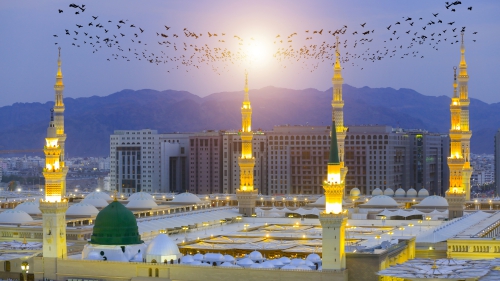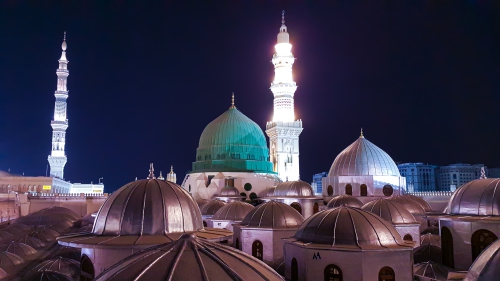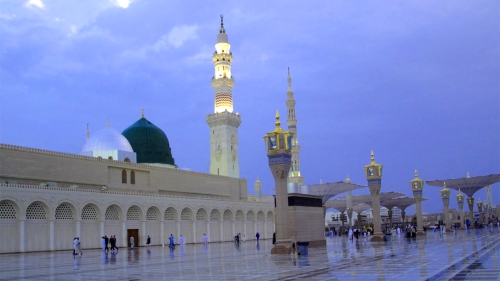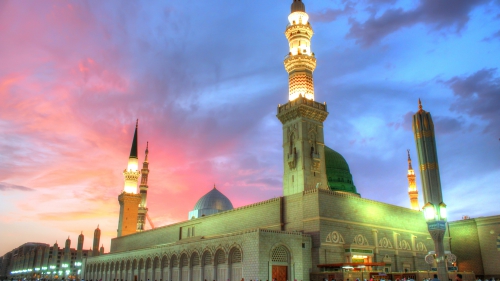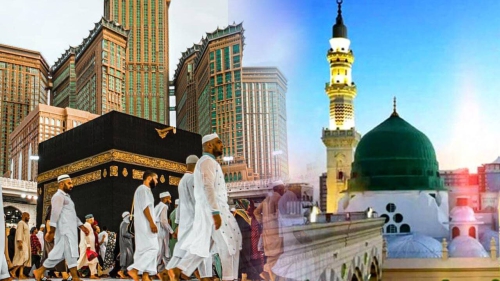The Prophet's Mosque as the Seat of the Prophet's Government
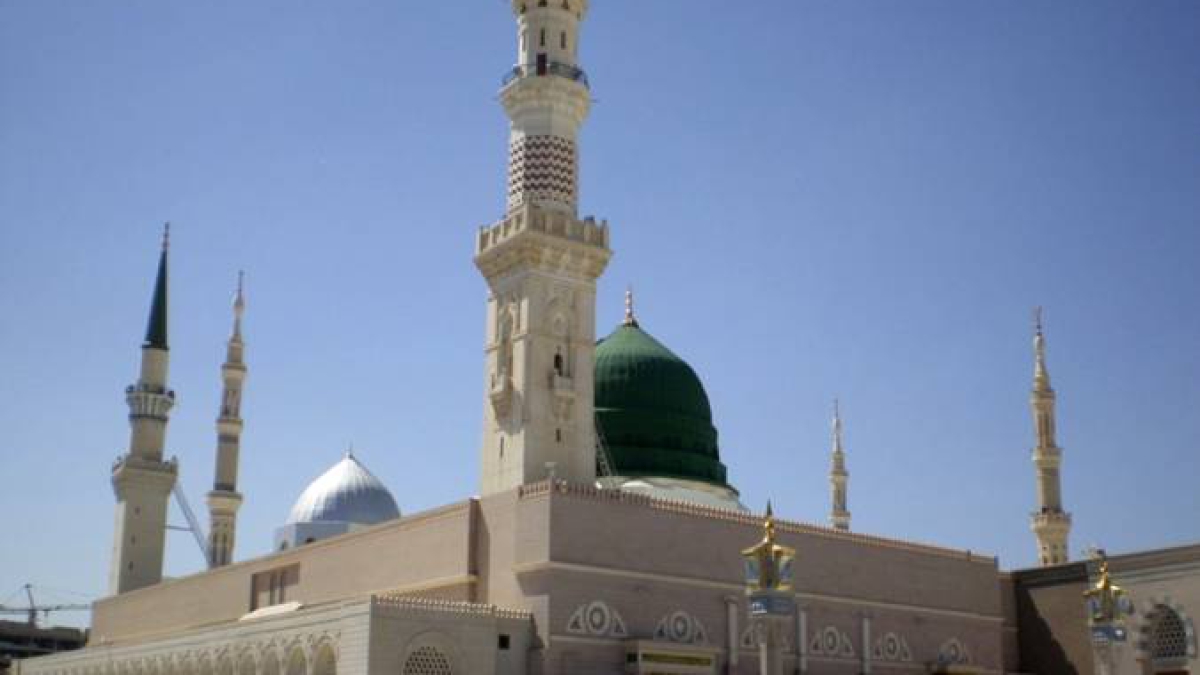
The mosque of the Prophet (pbuh) played the role of the seat of the first Islamic government. In the mosque, the Prophet (pbuh) used to spend long hours on a daily basis discussing, deciding and executing many affairs related to administering the state. Jihad (striving in the way of Allah) and state defense strategies were also initiated and concluded in the realm of the mosque. When returning from a journey, the Prophet (pbuh) used to go to his mosque first. There he would perform a short prayer of two units (rak'ah). Then, he would sit in the mosque and attend to the people and their needs.
As he was the head of the Madinah government and the leader of the state, it was only appropriate for the Prophet's houses to be built in the closest proximity to his mosque. Thus, against the outer side of the eastern wall of the mosque, the houses for the Prophet (pbuh) and his household were built. The eastern wall of the mosque was integrated into the configurations of the houses serving as their western wall. The doors of the houses opened into the mosque proper. In total, there were nine houses. The location of the Prophet's houses (his official residences) vis--vis his mosque implied convenience, accessibility, transparency and responsibility towards the people. Otherwise stated, it implied all the qualities needed for an excellent, competent, just and people-friendly government.
In his mosque, the Prophet (pbuh) received foreign dignitaries. A tent was set up in the mosque where from time to time some of the Prophet's guests would stay. Some guests would stay even in the suffah (a section in the mosque meant for the lodging of the poorest people in Madinah). However, more often than not, most of his guests would stay in some lofty houses which belonged to some companions and which had been appointed earlier for the purpose. When receiving foreign delegations, the Prophet (pbuh) used to put on the most beautiful apparel he had. He would furthermore ask his nearest companions to do the same.
Some of the Prophet's guests were non-Muslims or recent converts. As such, receiving them and making them stay in the mosque could soften their hearts, or could change for the better their stance on Islam and Muslims. The mosque was a center for promoting mutual understanding, tolerance and unity. It was the first active center in history for interfaith dialogue and cooperation. When a Christian delegation from Najran, a city in southwestern Arabian Peninsula, visited the Prophet (pbuh), he met them nowhere else but in the shades of his mosque. Their number was 60. They were led by a group of their priests. When the time of one of their prayers was due, they were allowed to pray right inside the mosque.
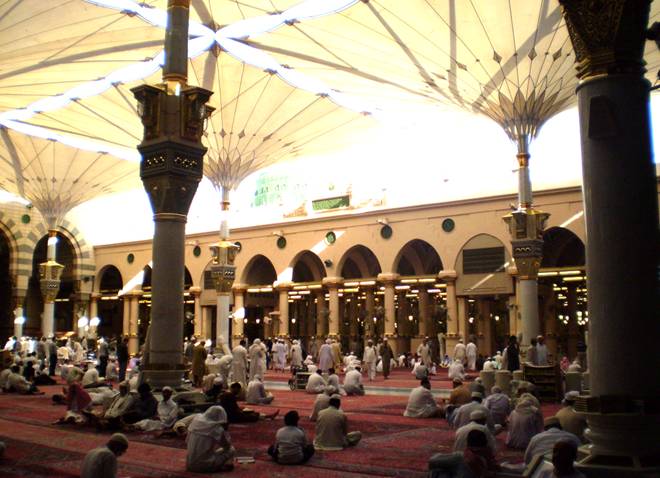 |
| The interior of the Prophet's mosque today |
In addition, since many Jews were residents of Madinah, their constant interactions with the Prophet (pbuh) and the Muslims at many levels, are well-documented. During the abovementioned visit by the Christians from Najran, a group of Jewish rabbis from Madinah likewise joined them and their discussion with the Prophet (pbuh). Such was truly an awesome sight, a dialogue between three Abrahamic monotheistic faiths and between some of their highest representatives, which was hosted by the Prophet (pbuh) inside his mosque, one of the holiest places in Islam. This particular role of the Prophet's mosque was a cause for revealing this Qur'anic verse: "Say: 'O People of the Scripture (Jews and Christians)! Come to an agreement between us and you: that we shall worship none but Allah, and that we shall ascribe no partner unto Him, and that none of us shall take others for lords beside Allah.' And if they turn away, then say: 'Bear witness that we are they who have surrendered (unto Him)" (Alu 'Imran, 3:64).
Allah also says, instructing Muslims, initiators and major stakeholders in interfaith dialogues, especially with Jews and Christians: "And do not dispute with the People of the Scripture (Jews and Christians) except by what is best, except those of them who act unjustly, and say: We believe in that which has been revealed to us and revealed to you, and our Allah and your Allah is One, and to Him do we submit" (al-'Ankabut, 29:46).
The mosque every so often also served as a revenue distribution center. When some goods collected in Bahrain as land tax came to the Prophet (pbuh) -- the biggest amount ever received during the Prophet's time -- he gathered the people in his mosque where everything till the last coin was fairly distributed.
The Prophet (pbuh) acted in his mosque as a judge too. However, the execution of sentences took place outside the mosque proper. The necessary punishments were implemented outside the mosque because they entailed several elements, such as spilling blood, noisy commotions, uttering improper words, cursing, et cetera, which were grossly inappropriate inside mosques. This, however, by no means implies that the punishments were carried out in isolation away from the public eye. Quite the opposite, they were carried out in relatively public places, some of which even adjoined the Prophet's mosque, serving as a deterrent against future crimes and criminals. Implementing the punishments, especially those for serious crimes, in a public place witnessed by members of the public, was an integral part of the Prophet's government's system of practices which were aimed at upholding people's moral and ethical behavior, as well as at deterring and mitigating crime. Hence, Allah says, for example, that when an adulterer and an adulteress are about to be flogged with a hundred stripes as a punishment for their shameful misdeed, a party of believers should witness the act (al-Nur, 24:2).
In view of the Prophet's mosque having served as the seat of the Prophet's government, some messengers representing some external tribes and communities would routinely upon entering Madinah go straight away to the mosque. In it, they were able to find either the Prophet (pbuh) or somebody else who would meet them and answer their queries. Some such messengers had acquaintance neither with the Prophet (pbuh) nor with the city of Madinah and its residents. However, they had an idea as to the importance of the Prophet's mosque, which posed a relief to them, as well as a springboard for discovering, knowing and experiencing everything that they had come for. An example of this is the arrival of a man called Dimam b. Tha'labah who was dispatched by his people to meet the Prophet (pbuh). Entering the mosque, he found the Prophet (pbuh) with a group of his companions. But so similar to others in both apparel and demeanor was the Prophet (pbuh) that the man, just like most other strangers, found it as good as impossible to recognize him. So the man had to ask some companions who the Prophet (pbuh) was.
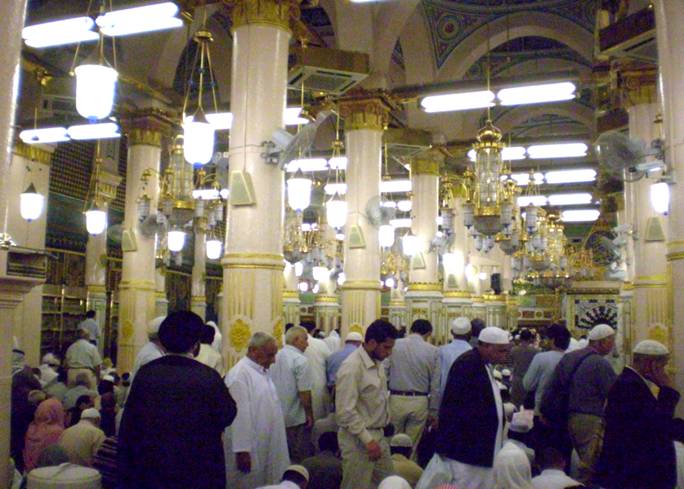 |
| A section of the Prophet's mosque today which was the mosque's original site during the Prophet's time. The mosque's eastern side, where most of the Prophet's houses stood, is pointed out. |
However, at times there were some people who fell short of grasping the real meaning and sanctity of the mosque, needing some time to do so. At the same time, furthermore, they also failed to grasp the real meaning and sanctity of the house institution in Islam. Thus, because Prophet Muhammad's houses abutted his mosque, their doors opening into it, the privacy and peace of Prophet Muhammad (pbuh) and his household were occasionally seriously threatened by the misconduct of those people. The Prophet (pbuh), however, had no choice but to patiently put up with some considerable discomfort until Allah by means of revelation eventually intervened and as a form of education to the people concerned brought the said matter to an end. Allah thus says in the Qur'an: "(As for) those who call out to you from behind the private apartments, surely most of them do not understand. And if they wait patiently until you come out to them, it would certainly be better for them, and Allah is Forgiving, Merciful" (al-Hujurat, 4-5). According to a number of accounts, some people used to call out impatiently and rudely to the Prophet (pbuh), most probably from inside his mosque, while he was spending some of his scarce free time inside his houses, without respecting his and his household's peace and privacy, and without waiting patiently until he came out to them and attended to their needs.
By reason of the importance of the mentioned incidents and the lessons given as a consequence, the Qur'anic chapter which deals with them is called "al-Hujurat" which means "the private or inner (Prophet's) apartments or houses". Moreover, the al-Hujurat chapter was revealed to the Prophet (pbuh) in the ninth year following the hijrah (migration), during which a large number of deputations of all kinds thronged to Madinah to meet the Prophet (pbuh) and offer their allegiance to Islam. That year in the history of Islam is thus called the "Year of Deputations." The Prophet (pbuh) used to meet the delegates inside his mosque right in front of some of his houses. The pillar which stands today at that historic meeting place is called the "Pillar of Deputations" (Ustuwan al-Wufud).
Towards the same end are the following Allah's instructions as well, also in the al-Hujurat chapter and just before the verses quoted above: "O you who believe, do not raise your voices above the voice of the Prophet, and do not speak loud to him as you speak loud to one another, lest your deeds became null while you do not perceive. Surely those who lower their voices before Allah's Messenger are they whose hearts Allah has proved for guarding (against evil); they shall have forgiveness and a great reward" (Al-Hujurat, 49:2-3).
*****
Dr. Spahic Omer, a Bosnian currently residing in Malaysia, is an Associate Professor at the Kulliyyah of Architecture and Environmental Design, International Islamic University Malaysia. He studied in Bosnia, Egypt and Malaysia. His research interests cover Islamic history, culture and civilization, as well as the history and philosophy of the Islamic built environment. He can be reached at spahico yahoo.com; his blog is at www.medinanet.org.
Topics: Masjid Al Nabawi
Views: 7982
Related Suggestions






